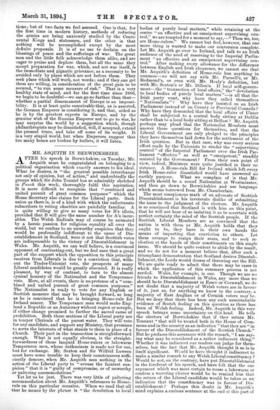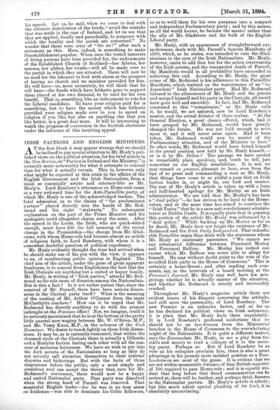MR. ASQUITH IN BERWICKSHIRE. A FTER his speech in Berwickshire, on
Tuesday, Mr. Asquith must be congratulated on belonging to a political organisation which exactly answers to his ideal. What he desires, is " the greatest possible interchange not only of opinion, but of action," and undoubtedly the groups which Sir John Tenniel has so admirably sketched in Punch this week, thoroughly fulfil this aspiration. It is more difficult to recognise that " combined and united pursuit of great common purposes" which the Home Secretary also claims for the Liberal party. Such union as there is, is of a kind with which the unfortunate subscribers to voting charities are painfully familiar. A is quite willing to give so many votes for B's idiots, provided that B will give the same number for A's incur- ables. The Welsh Radicals may of course be animated by a heroic passion for religious equality all over the world, but we confess to an unworthy suspicion that they would be profoundly indifferent to the cause of Die- establishment in Scotland, were it not that Scottish votes are indispensable to the victory of Disestablishment in Wales. Mr. Asquith, we can well believe, is a convinced opponent of contracting-out, but we feel sure that a great part of the support which the opposition to this principle receives from Liberals is due to a conviction that, with- out the Trades-Unionist vote, the prospects of many Liberal candidates would be greatly obscured. It is really pleasant, by way of contrast, to turn to the almost cynical honesty of the Nationalist and the Temperance Tote. Here, at all events, there is no pretence of a " com- bined and united pursuit of great common purposes." The Nationalist is ready to vote for any English or Scottish measure that may be brought forward, so long as he is convinced that he is bringing Home-rule for Ireland nearer. The Temperance man would make Eng- land a Republic or an Autocracy without regret or scruple, if either change promised to further the sacred cause of prohibition. Both these sections of the Liberal party are in temper Clericals of the purest water. They will vote for any candidate, and support any Ministry, that promises to serve the interests of what stands to them in place of a Church. Their part in the transaction is straightforward enough. What is not equally obvious, is the straight- forwardness of those languid Home-rulers or lukewarm Temperance men, whose enthusiasm is made not for use, but for exchange. Mr. Sexton and Sir Wilfrid Lawson must have some trouble to keep their countenances suffi- ciently demure, when Mr. Asquith sees nothing in the action of the Liberal party to arouse the faintest sus- picion " that it is " guilty of compromise, or of unworthy or paltering accommodations." Yet let us be just. There was very little of paltering accommodation about Mr. Asquith's references to Home- rule on this particular occasion. When we read that all that he means by the phrase is " the devolution to local bodies of purely local matters," while retaining at the centre "an effective and an omnipotent supervising con- trol," we are tempted for a moment to say,—" Then we, too, are Home-rulers." We cannot but feel, however, that one more thing is wanted to make our conversion complete. Let Mr. Asquith go over to Ireland, and talk to an Irish audience of the need of reserving to the Imperial Parlia- ment " an effective and an omnipotent supervising con- trol." After making every allowance for the difference between English and Irish eloquence, we cannot see that Mr. Asquith's definition of Home-rule has anything in common—we will not say with Mr. Parnell's, or Mr. Redmond's, or even with Mr. Healy's definition, but with Mr. Sexton's or Mr. Dillon's. If local self-govern- ment—the " transaction of local affairs," the " devolution to local bodies of purely local matters "—is all that the Irish party want, why have they called themselves " Nationalists " ? Why have they insisted on an Irish Parliament instead of on County or Provincial Councils ? Why have they demanded that the local affairs of Ulster shall be subjected to a central body sitting at Dublin rather than to a local body sitting at Belfast ? Mr. Asquith perhaps may plead that the Nationalist Members must answer these questions for themselves, and that the Liberal Government are only pledged to the principles they have themselves laid down for the settlement of the Irish question. But in that case, why was every serious effort made by the Unionists to render the " supervising control" of the Imperial Parliament over the Irish Par- liament " effective " as well as " omnipotent," steadily resisted by the Government? From their own point of view, indeed, Ministers were quite justified in their re- sistance. A Home-rule Bill for Ireland which left every Irish Home-ruler dissatisfied would have answered no earthly purpose. What we complain of is that Mr: Asquith should be a sound Nationalist at Westminster, and then go down to Berwickshire and use language which seems borrowed from Mr. Chamberlain.
The most conspicuous mark of an advocate of Scottish Disestablishment is his inveterate dislike of submitting the issue to the judgment of the electors. Mr. Asquith is so convinced that Scotland is with him on this point, that he will not hear of so isolating it as to ascertain with perfect certainty the mind of the Scottish people. If the Scottish Liberal Members are as convinced that the nation is with them as Mr. Asquith holds that they ought to be, they have in their own hands the means of imparting that conviction to others. Let them arrange to resign their seats, and to seek re- election at the hands of their constituents on this single issue. We should be quite content to abide by the result, and we do not for a moment believe that, after such a. triumphant demonstration that Scotland desires Disestab- lishment, the Lords would dream of throwing out the Bill. We are quite ready to admit that there may be cases in which the application of this summary process is not needed. Wales, for example, is one. Though we are no friends to Disestablishment in Wales, any more than we should be to Disestablishment in Essex or Cornwall, we do not doubt that a majority of Welsh voters are in favour of it, just as. for anything we know to the contrary, a majority of East Anglian or of Cornish voters may be. But we deny that there has been any such unmistakable evidence of Scotch feeling on this question as there has been of Welsh feeling. Indeed, Mr. Asquith in this very speech betrays some uncertainty on this head. He tells the electors of Berwickshire that if they return Mr. Tennant " that will be treated both in the House of Com- mons and in the country as an indication " that they are " in favour of the Disestablishment of the Scottish Church." But he prefaces this assurance with the remark, " I am say- ing what may be considered as a rather indiscreet thing." Whether it was indiscreet our readers can judge for them- selves, but the fact that Mr. Asquith thought it so is in itself significant. Would be have thought it indiscreet to make a similar remark to any Welsh Liberal constituency ? Would he not, on the contrary, have put Disestablishment in the forefront of his speech, and have felt that the one argument which was most certain to rouse a lukewarm or confirm a wavering elector would be to remind him that the return of the Liberal candidate would be taken as an indication that the constituency was in favour of Dis- establishment ? Perhaps this doubt in Mr. Asquith's mind explains a curious sentence at the end of this part of his speech. Let us, he said, when we come to deal with the ultimate distribution of the funds," avoid the mistake that was made in the case of Ireland, and let us see that they are applied, locally and parochially, to purposes with which the locality and the parish are concerned." No wonder that there were cries of " Go on ! " after such a statement as this. Here, indeed, is something to make Disestablishment popular. When once the vested interests of living persons have been provided for, the endowments of the Established Church of Scotland—her fabrics, her manses, her glebes, her teinds—will all be made over to the parish in which they are situated. There will now be no need for the labourer to look with alarm at the prospect of having no church and no minister provided for him. He will have—or, more accurately, he will think that he will have—the funds which have hitherto gone to support them placed at his own disposal, to be used for his own benefit. That is, something like an inducement to vote for the Liberal candidate. To have your religion paid for is something, but to have the money which has hitherto provided your religion made over to you to spend on religion if you like, but also on anything else that you like better, is a great deal more. It will be interesting to watch the progress of conversion in the Scottish electorate under the influence of this inspiring appeal.



































 Previous page
Previous page